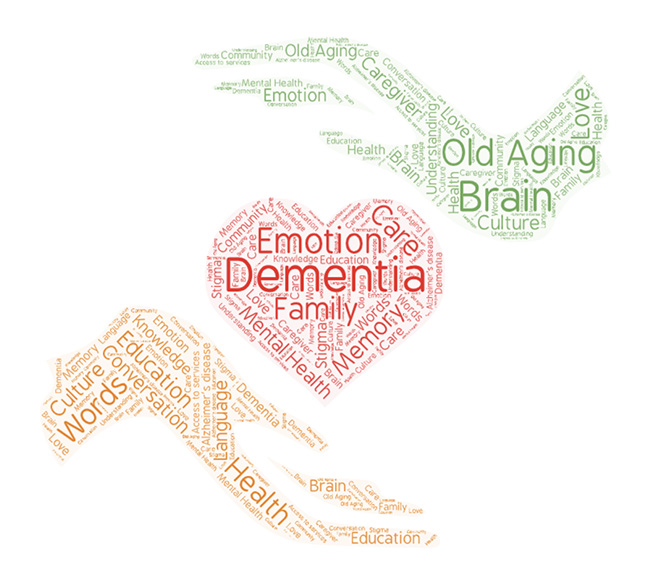The Language of Dementia
In one of the first meetings for our ARTZ in the Neighborhood project in Northwest Philadelphia, members of the ARTZ community, the nursing community, and the La Salle community gathered together to discuss what dementia means for us and others. In thinking through a project that would be tailored specifically for those in the Northwest Philadelphia community, we thought a lot about what dementia means for this community. One of the things we discussed was the language of dementia and how this language is different for everyone.
Merriam Webster’s definitions of language: the words, their pronunciation, and the methods of combining them used and understood by a community. The suggestion by objects, actions, or conditions of associated ideas or feelings.
What is the definition of language? In our experiences as speakers and listeners, we learn that language is more than the way we communicate; it is the way we understand, the way we think, and the way we perceive.
Those living with dementia have been affected by language in a unique way. History has shown us that conversations around health can shape our perceptions of those affected, and in particular, the way we view those living with dementia can affect how we treat them and the conversations we have about dementia.

When Geriatrician Dr. Xinqi Dong spoke Mandarin to tell his patient, Mr. Shi, that he had dementia, Mr. Shi heard “crazy and catatonic.” This was not because Mr. Shi was told this, but because the direct translation of “dementia” in Mandarin were two characters that meant crazy and catatonic. Mr. Shi expressed his distress and concerns; he did not want to bring shame to his family.
Since then, researchers like Dr. Xinqi Dong have looked at dementia and tried to address its stigma in Chinese communities.
In other communities, dementia is discussed as a part of old aging. Two of my closest friends whose families come from Peru and Ecuador both shared a similar sentiment: in their communities, dementia is perceived as a natural part of aging. And with this aging comes the responsibility of family to take care of the older loved ones.
“For the people I know, that’s just what happens with old age,” began Carolina Soto.
“We do know the word Alzheimer’s. It’s viewed as any old age mental disorder. It’s more like ‘it’s normal, comes with age, we love you and care for you.’”
A blog written by nursing staff from the University of Southern California notes that those in Latino communities are “50 percent more likely to develop Alzheimer’s than non-Latino whites.” The authors also point out that families are more likely to “rely on informal care from family and community members, which can lead to poor health outcomes because of low awareness and limited access to medical resources.”
In African American communities, a similar perspective of dementia being a natural part of aging is shared. Some families take on the full responsibility of caring for a loved one who is diagnosed with dementia without the knowledge of or access to many resources.
In a USA Today article, Rushern Baker III, former Prince George’s County, MD., executive, describes how his life was changed when his wife, Christa, was diagnosed with young onset dementia in her late 40s.
“In our community you didn’t talk about it,” Baker said to USA Today. “By the time it is clear something is wrong, you are two to three years in. The things you could have done to prepare family financially and emotionally don’t happen until you are in the last stages.”
—
Dementia can mean many things. It can mean changes in memory, changes in actions, or changes in talking and communicating. Depending on our community and the language we use to describe it, dementia can also take on different meanings. No matter the community one belongs to, the conversation around dementia is important. By discussing dementia, we open up a way to educate ourselves and others on what dementia means for those diagnosed and for their loved ones. No matter what words one chooses to talk about dementia, the hope is that the words are positive, understanding, patient, and supportive. With words like these, we can help fight the stigma that those living with dementia face.
